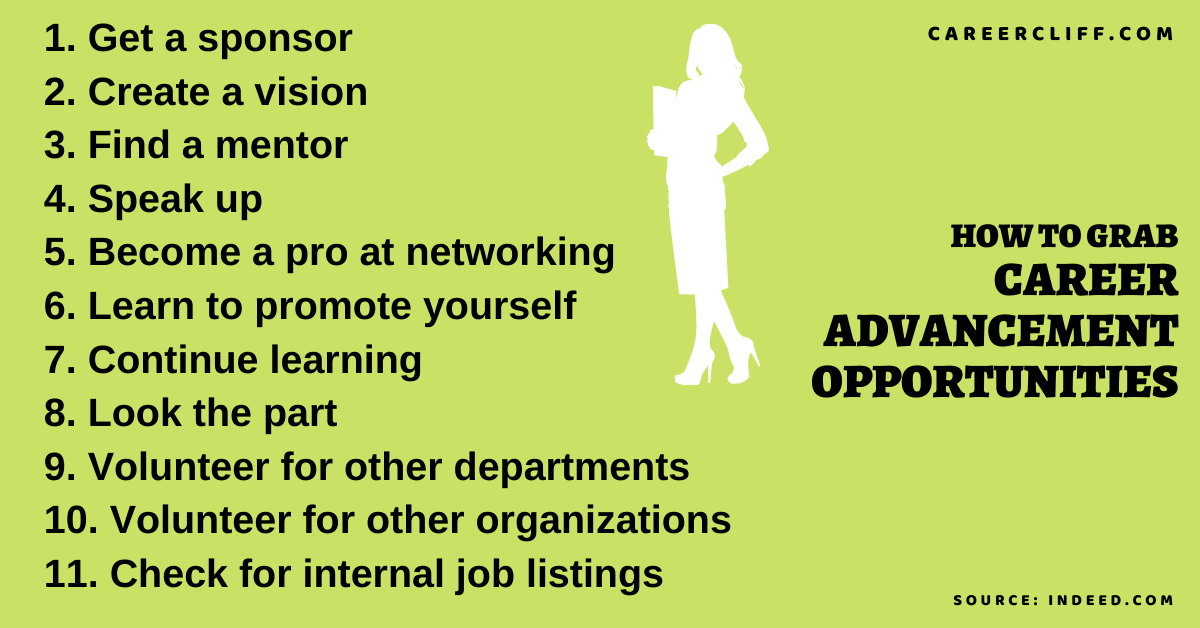Career Advancement Tips, the key to unlocking your full potential and skyrocketing your career success. From setting clear goals to seeking mentorship, this guide will provide you with the strategies you need to climb the corporate ladder with confidence and finesse.
Importance of Career Advancement
Career advancement is like leveling up in a video game – it’s crucial for your professional growth and success. Climbing the career ladder opens up new opportunities, challenges, and rewards that can take your career to the next level.
Increased Job Satisfaction and Fulfillment
Advancing in your career can lead to increased job satisfaction and fulfillment as you take on more responsibility, tackle new projects, and achieve your professional goals. With each step forward, you’ll feel a sense of accomplishment and pride in your work.
Benefits of Continuous Career Development
- Enhanced Skills: By advancing in your career, you’ll have the chance to develop new skills, knowledge, and expertise that can make you more valuable in the job market.
- Higher Earning Potential: As you progress in your career, you may have the opportunity to earn a higher salary, bonuses, or other financial incentives.
- Expanded Network: Career advancement can help you build a strong professional network, opening doors to new connections, mentors, and opportunities.
- Personal Growth: Advancing in your career can also lead to personal growth, increased confidence, and a greater sense of self-worth.
Setting Clear Career Goals
Setting clear career goals is crucial for anyone looking to advance in their professional life. It gives direction, motivation, and a sense of purpose to your career journey. Without clear goals, it’s easy to feel lost or stuck in a rut. Here are some tips on how to set SMART career goals:
Importance of Specific and Achievable Goals
Setting specific and achievable career goals helps you focus your efforts and resources on what truly matters. It gives you a clear target to aim for and allows you to track your progress effectively. Without specific goals, it’s hard to measure your success or know if you’re on the right track.
- Specific: Define exactly what you want to achieve. Instead of saying “I want to get promoted,” say “I want to get promoted to a senior manager position within the next two years.”
- Measurable: Make sure your goals are quantifiable. Include numbers, percentages, or other measurable indicators to track your progress.
- Achievable: Set goals that are challenging but realistic. Don’t aim too high that they become unattainable, but also don’t make them too easy that they don’t push you to grow.
- Relevant: Your goals should align with your long-term career aspirations and the direction you want your career to take. Make sure they contribute to your overall career advancement.
- Time-bound: Set deadlines for your goals to create a sense of urgency and accountability. This helps you stay focused and motivated to work towards achieving them.
Examples of Short-term and Long-term Career Goals
- Short-term goal: Complete a professional certification in your field within the next six months to enhance your skills and marketability.
- Long-term goal: Become a department head in your company within the next five years by consistently delivering outstanding results and demonstrating leadership qualities.
Skill Development for Career Growth

In today’s competitive job market, skill development plays a crucial role in advancing one’s career. Employers are constantly looking for candidates who possess a diverse set of skills that can contribute to the success of their organization. Therefore, it is essential for individuals to continuously work on enhancing their skills to stay relevant and competitive in their field.
The Importance of Acquiring Both Hard and Soft Skills
Acquiring both hard and soft skills is vital for career progression. Hard skills refer to technical abilities and specific knowledge related to a particular job or industry. On the other hand, soft skills are interpersonal skills that enable individuals to work well with others and effectively navigate the workplace. Employers value candidates who have a combination of both hard and soft skills as they are able to perform their job duties efficiently and collaborate effectively with colleagues.
- Hard skills are tangible and teachable skills that are often job-specific, such as coding, data analysis, or project management.
- Soft skills, on the other hand, include communication, teamwork, problem-solving, and leadership abilities.
- By developing a balance of hard and soft skills, individuals can position themselves as well-rounded professionals who are adaptable to various work environments.
Strategies for Identifying Valuable Skills in a Specific Industry
It is important to identify which skills are most valuable in a specific industry or role to focus your efforts on skill development effectively. Here are some strategies to help you determine which skills to prioritize:
- Research job postings and industry trends to identify in-demand skills within your field.
- Seek feedback from mentors, colleagues, or industry professionals to gain insights into the skills that are highly valued in your industry.
- Consider taking courses or certifications to acquire new skills or enhance existing ones that are relevant to your career goals.
- Stay updated on emerging technologies and trends in your industry to ensure you are equipped with the latest skills required for career advancement.
Networking and Building Professional Relationships

Building professional relationships and networking are crucial aspects of advancing in your career. These connections can lead to new opportunities, collaborations, and valuable insights that can help you grow in your field. Whether online or in person, effective networking can open doors to various career prospects.
The Significance of Networking
Networking allows you to meet new people in your industry, exchange ideas, and gain valuable advice. It can help you stay updated on industry trends, job openings, and potential career paths. By building a strong network, you create a support system that can offer guidance and mentorship.
Tips for Effective Networking
- Attend industry events, conferences, and seminars to meet professionals in your field.
- Utilize social media platforms like LinkedIn to connect with industry experts and peers.
- Join professional organizations or networking groups to expand your contacts.
- Follow up with contacts regularly and maintain relationships by offering help and support.
Examples of Career Opportunities through Networking
Building professional relationships can lead to various career opportunities, such as job referrals, collaborations on projects, speaking engagements, and even mentorship opportunities. By networking effectively, you can access a wide range of possibilities that can propel your career forward.
Seeking Mentorship and Guidance
Finding a mentor can be a game-changer in your career journey. A mentor is someone who can offer valuable guidance, share their experiences, and provide insights to help you navigate the challenges and opportunities in your professional life.
Benefits of Having a Mentor
- Gain valuable advice and perspective from someone with more experience.
- Access to a broader network and opportunities through your mentor’s connections.
- Receive constructive feedback to help you improve and grow in your career.
- Enhance your skills and knowledge based on your mentor’s expertise.
- Boost your confidence and motivation with the support of a mentor.
Finding a Suitable Mentor and Building a Productive Relationship
- Identify your goals and what you hope to achieve from mentorship.
- Look for someone who has the experience, skills, and qualities you admire.
- Reach out to potential mentors through networking events, professional organizations, or social media.
- Build rapport by showing genuine interest, being respectful, and actively listening to their advice.
- Establish clear communication and set expectations for the mentor-mentee relationship.
Accelerating Career Growth with Mentorship
- Receive guidance on navigating career challenges and making strategic decisions.
- Learn from your mentor’s experiences and avoid common pitfalls in your career path.
- Expand your professional network and access new opportunities through mentor referrals.
- Gain insights into industry trends, best practices, and emerging technologies.
- Develop leadership skills and enhance your overall performance with mentor support.
Continuous Learning and Professional Development: Career Advancement Tips
Continuous learning is essential for staying relevant in today’s ever-evolving workforce. With rapid advancements in technology and changing industry trends, professionals must continuously update their skills and knowledge to remain competitive in the job market.
Importance of Continuous Learning
- Keeps you up-to-date with industry trends and best practices.
- Enhances your problem-solving abilities and critical thinking skills.
- Demonstrates to employers your commitment to personal and professional growth.
Strategies for Pursuing Further Education, Career Advancement Tips
- Enroll in online courses or degree programs to enhance your skills and knowledge.
- Attend workshops, seminars, and conferences to stay informed about the latest developments in your field.
- Seek opportunities for on-the-job training or shadowing more experienced colleagues.
Platforms and Resources for Professional Development
- LinkedIn Learning offers a wide range of courses on various topics to help you upskill.
- Coursera and edX provide access to online courses from top universities and institutions worldwide.
- Professional organizations and industry conferences often offer workshops and networking opportunities for career development.
Overcoming Career Plateaus
When you find yourself stuck in a career plateau, it can be frustrating and demotivating. Identifying the reasons behind these plateaus is crucial to moving forward and reigniting your professional growth.
Common Reasons for Career Plateaus
There are several common reasons why individuals experience career plateaus:
- Feeling stagnant in your current role without any opportunities for growth or advancement.
- Lack of challenges or new projects that can help you develop new skills.
- Not receiving recognition or rewards for your hard work and accomplishments.
Tips to Overcome Career Plateaus
Here are some tips to help you overcome career plateaus and kickstart your professional growth:
- Seek out new opportunities within your current organization or consider changing roles to learn new skills.
- Set clear and achievable goals for yourself to stay motivated and focused on your career progression.
- Network with professionals in your field to gain new insights and perspectives that can help you break through plateaus.
- Take on new challenges that push you out of your comfort zone and encourage personal growth.
Importance of Self-Reflection and Seeking New Challenges
Self-reflection is essential in overcoming career plateaus as it allows you to evaluate your current situation, identify areas for improvement, and set new goals. Seeking new challenges is equally important as it helps you break out of your routine and discover untapped potential within yourself.
